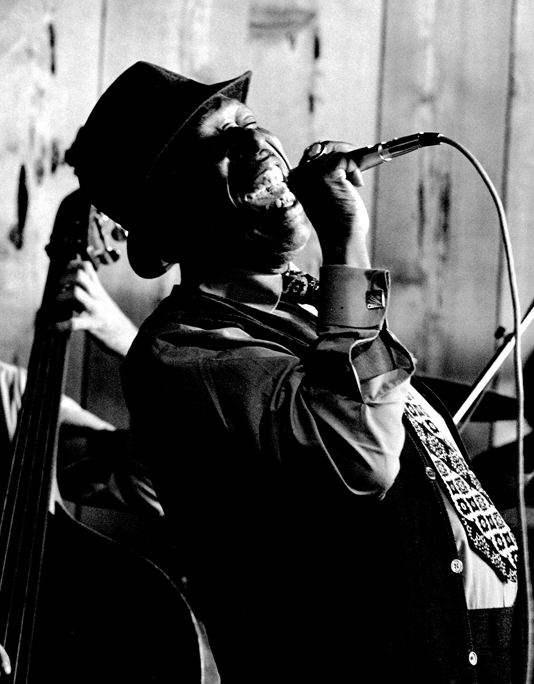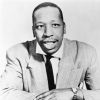Home » Jazz Articles » Profile » Eddie Jefferson: The Scientist of Vocalese
Eddie Jefferson: The Scientist of Vocalese
 Detroit once had a reputation as the "Killer Kapital," but things have changed—Dave Bing, basketball Hall of Famer is Mayor and is striving to clean up the city. But 32 years ago, actress Brenda Vaccarro and altoist Richie Cole witnessed the drive-by shotgun slaying of the architect of Vocalese, Eddie Jefferson, at Bakers' Lounge. Jefferson was shot and killed May 8, 1979, walking out of the venue, after playing a set with co-leader Cole.
Detroit once had a reputation as the "Killer Kapital," but things have changed—Dave Bing, basketball Hall of Famer is Mayor and is striving to clean up the city. But 32 years ago, actress Brenda Vaccarro and altoist Richie Cole witnessed the drive-by shotgun slaying of the architect of Vocalese, Eddie Jefferson, at Bakers' Lounge. Jefferson was shot and killed May 8, 1979, walking out of the venue, after playing a set with co-leader Cole.Vocalese was first created by Jefferson's lyrical writings to James Moody's "Moody's Mood For Love," taken from "I'm In The Mood For Love," the saxophonist first recording it with the Swedish Symphony. Jefferson's lyrics were redone by singer King Pleasure, who made it a tremendous hit in 1952, extending Jefferson's lyrical popularity around the world with his interpretive rendition of Moody's playing and Jefferson's vocalese stylings.
Jon Hendricks was inspired by Jefferson's interpretive lyrical writings to jazz passages with the incarnation of Lambert, Hendricks & Ross in 1957, also including Dave Lambert and Annie Ross. Lambert, Hendricks & Ross' first interpretations were on its debut, Sing A Song Of Basie (Verve, 1957), later followed by Horace Silver's "Come On Home," on The Hottest New Group in Jazz (Columbia, 1960), the vanguard that catapulted the trio's popularity.
Oscar Brown Jr.'s vocalese renditions of pianist Bobby Timmons's ""Dis Here" and "Dat Dere" were later followed by interpretations of cornetist Nat Adderley's "Work Song" and Mongo Santamaria's "Afro Blue."
Jefferson created a spontaneous combustion among singers who could write. His lyrics focused on the artist' musical linings, as in his version of Miles Davis' "So What": "Miles Davis left the Stage / Rehearsals were over / So What." Some of his lyrics were humorous, like on "Bennies From Heaven," borrowed from the Broadway hit, "Pennies From Heaven": "Bennie May Be From Heaven / but he sure ain't from me."
Many others followed with their conversions of jazz playing. Carmen McRae wrote to Dave Brubeck's "Take Five," not Al Jarreau, as so many think. But Jarreau did write lyrics to Freddie Hubbard's "Little Sunflower"; Johnny Guitar Watson and Larry Williams wrote for Joe Zawinul's "Mercy, Mercy, Mercy"; Gloria Lynne did the same to King Curtis "Soul Serenade"; Bill Henderson wrote and sang lyrics to Horace Silver's "Senor Blues" and Benny Golson's "Whisper Not"; Mark Murphy laid vocalese to Oliver Nelson's "Stolen Moments"; and guitarist George Benson became world famous for his recording of Jefferson's lyrics to "Moody's Mood For Love."
The Manhattan Transfer met Jefferson and commissioned him to wonderfully translate Zawinul's Weather Report hit, "Birdland," and Charlie Parker's "Joy Spring." Others followed in Jefferson's vocalese footsteps, including Betty Carter, Kurt Elling, Bob Dorough, Mel Torme, Nancy Wilson, Dee Dee Bridgewater, Dianne Reeves and Karrin Allyson.
Yes, a shotgun blast ended the life of Eddie Jefferson, the Scientist of Vocalese; but he is the Phoenix, reincarnated forever within the inner sanctums of lyrical jazz: "There I Go, There I Go / James Moody / You can come on in man / and blow now if you want to / I'm through."
Photo Credit
Brian McMillen
Tags
Eddie Jefferson
Profiles
Ed Hamilton
United States
Richie Cole
James Moody
Jon Hendricks
Lambert, Hendricks & Ross
Dave Lambert
Annie Ross
Horace Silver
Oscar Brown Jr.
Bobby Timmons
Nat Adderley
Mongo Santamaria
Miles Davis
Carmen McRae
Dave Brubeck
Al Jarreau
Freddie Hubbard
Larry Williams
Joe Zawinul
Gloria Lynne
King Curtis'
Bill Henderson
benny golson
Mark Murphy
Oliver Nelson
george benson
The Manhattan Transfer
Weather Report
Betty Carter
Kurt Elling
Bob Dorough
Mel Torme
Nancy Wilson
Dee Dee Bridgewater
Dianne Reeves
Karrin Allyson
PREVIOUS / NEXT
Support All About Jazz
 All About Jazz has been a pillar of jazz since 1995, championing it as an art form and, more importantly, supporting the musicians who make it. Our enduring commitment has made "AAJ" one of the most culturally important websites of its kind, read by hundreds of thousands of fans, musicians and industry figures every month.
All About Jazz has been a pillar of jazz since 1995, championing it as an art form and, more importantly, supporting the musicians who make it. Our enduring commitment has made "AAJ" one of the most culturally important websites of its kind, read by hundreds of thousands of fans, musicians and industry figures every month.























